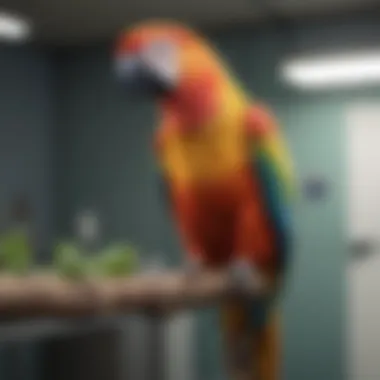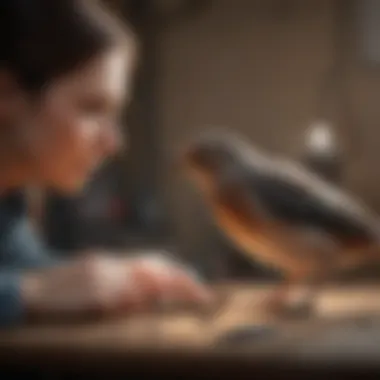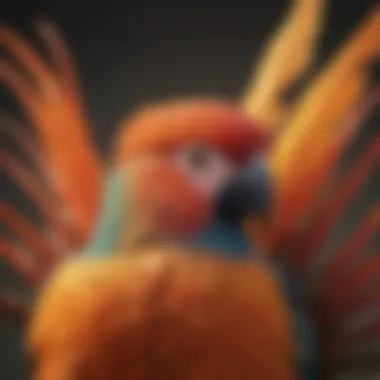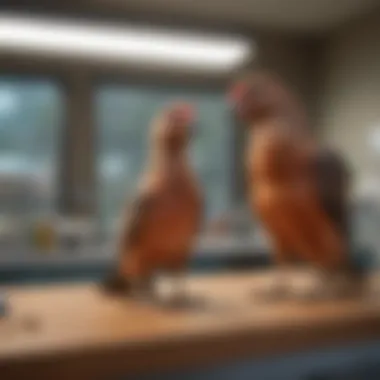Finding a Certified Avian Vet Near You


Intro
Birds, often seen as vibrant companions in our homes, have unique health and emotional needs. While they may seem low-maintenance compared to dogs or cats, avian pets require specialized care. This article provides essential insights into the significance of finding a board certified avian veterinarian. These specialists go through rigorous training to ensure they understand the complexities of avian medicine. By exploring how to locate these qualified professionals, we empower pet owners to prioritize their birds' health effectively.
Understanding Your Pet
Taking an in-depth look at your avian companion is crucial. Different species possess distinct behaviors and needs which can greatly influence their health. By understanding these characteristics, bird owners can create a supportive and nurturing environment.
Pet Behavior Basics
Birds communicate in subtle ways. Observing their body language can offer insights into their emotional state. For instance, a puffed-up bird may feel threatened or unwell, while flapping wings could indicate excitement or anxiety. Learning these signals helps owners respond appropriately.
Common Breed Characteristics
Species-specific knowledge is vital. Parrots, for instance, may exhibit playful behaviors and require social interaction, while finches enjoy a more tranquil environment. Familiarizing oneself with the specific characteristics of breeds helps cater to their individual needs.
Species-Specific Needs
Each species has unique dietary and habitat requirements. For example, lovebirds benefit from plenty of social interaction and toys, while canaries are known for their singing and need sufficient space to fly. Understanding these needs promotes overall wellbeing and happiness.
Health and Wellness
Regular veterinary check-ups are fundamental for maintaining your bird's health. This ensures that any issues are identified early and addressed properly.
Routine Vet Check-ups
Just like cats and dogs, birds benefit from annual veterinary examinations. A board certified avian vet can detect ailments that might not be visible to the owner.
Vaccination Needs
Vaccinations are crucial for preventing diseases common in avian species. A vet can provide tailored advice on the necessary vaccinations for your specific bird.
Recognizing Signs of Illness
Being aware of signs of illness is essential. Changes in behavior, such as reduced activity or changes in vocalization, can be red flags. Prompt veterinary consultation is always advised for suspected health issues.
It's crucial for pet owners to acknowledge that birds are prey animals. They often hide their illnesses until they are quite serious. Prompt recognition of behavioral changes can lead to earlier intervention.
Culmination
Finding a board certified avian vet ensures that your feathered friend receives expert care tailored to their specific needs. By understanding your pet's behavior, adhering to proper health routines, and recognizing when to seek help, you enhance their quality of life. This knowledge empowers bird owners to make informed decisions, ultimately leading to a healthier, happier pet.
Understanding Avian Health Care
Understanding avian health care is critical for pet owners who cherish their birds as family members. Birds are unique creatures with distinct anatomical and physiological characteristics compared to more common pets like cats and dogs. Their needs are often overlooked, leading to preventable illnesses or poor health management. It is crucial for avian owners to realize that specialized veterinary care is not merely a luxury but a fundamental requirement for the well-being of their birds.
Avian health care encompasses a variety of aspects, from nutritional needs to preventive measures and emergency treatments. In addition, understanding species-specific requirements can significantly affect a bird’s lifespan and quality of life. For instance, diets for parrots will differ greatly from those needed by canaries or finches. Exposure to the right information can empower bird owners to provide better environments and care practices.
Birds often hide signs of illness until conditions are serious; hence, regular check-ups with a board-certified avian vet can be advantageous. The insight provided by a specialized veterinarian can assist owners in recognizing subtle symptoms that may indicate underlying issues. This proactive approach helps in early identification and treatment of potential problems, reducing stress for both pets and owners.
"Specialized care can greatly enhance the life quality of your avian friend."


Thus, understanding avian health care means nurturing a relationship with professionals who truly grasp the complexities of avian biology and behavior. It prepares pet owners to make informed decisions about their bird’s health that might not occur with general veterinary care.
The Importance of Specialized Veterinary Care
Specialized veterinary care for birds is just as essential as it is for humans. Birds have unique health and behavioral needs that require tailored approaches. Certified avian vets have extensive training in areas specific to avian species. They are adept at diagnosing conditions that may not be easily recognized by general animal practitioners. When in doubt, consulting an expert can lead to quicker resolutions and healthier outcomes for your bird.
Proper avian care goes beyond typical vaccinations and check-ups. It may require specialized equipment and techniques for surgeries, diagnostics, and treatment. An avian vet’s expertise can cover various procedures, including crop surgeries or feather plucking assessments, which need a delicate and knowledgeable touch.
Investing in specialized veterinary care minimizes the risks associated with generalized treatments that may not consider avian-specific needs. It emphasizes the significance of trained professionals in maintaining not only the physical health of birds but their emotional well-being as well.
Differences Between Canine-Feline and Avian Care
The distinctions between canines, felines, and avians in terms of care are profound. While both dogs and cats share many similarities in anatomy and treatment protocols, birds are fundamentally different. Understanding these differences is vital for bird owners.
- Anatomy: Birds have hollow bones, a unique respiratory system, and a beak instead of teeth. This requires different anesthesia and surgical techniques that differ significantly from those used in dogs and cats.
- Diet: Dietary requirements are crucial for bird health. Unlike dogs and cats who may thrive on standard pet foods, birds need specific seeds, pellets, and fresh foods tailored to their species. An unbalanced diet can lead to severe health problems.
- Behavioral Needs: Birds are social creatures that can develop behavioral issues if not adequately stimulated. Their need for mental and social enrichment is notably different from the needs of most dogs and cats.
Understanding these differences not only leads to better care but also prepares owners for the requirements specific to their avian companions. In summary, when looking for avian care, remember that specialized knowledge is not optional; it is essential.
What is a Board Certified Avian Vet?
Understanding the role of a board certified avian vet is crucial for bird owners. These veterinarians have taken extra steps to ensure they provide specialized care tailored for avian species. When pet owners seek an avian vet, they are often looking for the best possible care for their feathered companions. Board certification indicates a vet's commitment to avian medicine and signifies a higher level of expertise than general practitioners.
Board certified avian veterinarians undergo rigorous training and evaluation. This level of specialization makes them valuable in diagnosing and addressing unique health issues that birds face. In this article, we will explore the importance of certification, standards required for it, and how these factors significantly influence the quality of care provided to avian patients.
Certification Standards and Importance
The certifying body for avian veterinarians is the American Board of Veterinary Practitioners (ABVP). This organization has established strict criteria for board certification, ensuring that only highly qualified individuals can achieve this distinction. To become board certified, a veterinarian must meet specific education and experience requirements.
- Educational Requirements: Candidates must hold a Doctor of Veterinary Medicine (DVM) degree from an accredited institution.
- Experience: Candidates usually require several years of practice in avian medicine.
- Examination: They must pass a comprehensive examination that tests their knowledge in various areas of avian health and disease.
This certification is vital because it promises that the vet is not merely practicing avian medicine but has a deep understanding of the species-specific needs. Board certified avian vets are more likely to keep updated with the latest advancements in avian medicine and safety protocols.
How Certification Impacts Quality of Care
The quality of care provided by a board certified avian vet differs significantly from generalists. This can be observed in several key aspects:
- Advanced Knowledge: They have extensive knowledge about avian anatomy, behavior, and diseases, allowing them to provide precise diagnoses and effective treatments.
- Greater Patient Outcomes: Studies show that pets treated by certified specialists often have better outcomes. This is especially true for complex cases that require an in-depth understanding of avian physiology.
- Holistic Approaches: Board certified avian vets often adopt a more holistic approach in treatment, considering not only the illness but also the overall wellbeing of the bird, including dietary and environmental factors.
In recognizing the value of certification, pet owners should prioritize these specialized veterinarians to ensure their birds receive comprehensive, nuanced care.
"Choosing the right vet can be the difference between a simple treatment and a complex health crisis in birds."
Certifications can give pet owners confidence in their vet's qualifications. Finding a board certified avian veterinarian can indeed lead to improved health outcomes for your bird.
Locating a board certified avian veterinarian is a critical step in ensuring your bird's health and well-being. Birds are unique animals requiring specific medical and behavioral care tailored to their needs. The right avian vet can provide the expertise needed to keep your bird healthy, diagnose issues accurately, and offer preventive care. This section details key methods to find qualified avian vets in your area so you can ensure that your feathered family member receives appropriate care.
Utilizing Online Resources
In today's digital age, the Internet offers numerous platforms to help locate board certified avian vets. Websites dedicated to veterinary services often have a search feature that allows users to find local specialists based on their geographic location.
Some specific websites, like the Association of Avian Veterinarians (AAV) and the American Veterinary Medical Association, provide directories of certified avian veterinarians. Utilizing these resources not only allows you to find a qualified vet near you but often includes reviews and ratings from other pet owners, offering insights into the quality of care provided.
Additionally, social media platforms such as Facebook have community groups where pet owners share recommendations. Searching keywords like "avian vet near me" or "bird veterinarians" on platforms like Reddit can yield results and personal experiences from other bird owners. Don't overlook the power of online forums to connect with other bird lovers for advice and suggestions.


Consulting Local Pet Owners
Engaging with fellow pet owners in your area can be a fruitful way to find board certified avian vets. Bird enthusiasts often gather at pet stores, bird shows, or local clubs. Building connections within these communities can lead to referrals that you may not find online.
When asking for recommendations, consider asking specific questions like:
- What has been your experience with the vet?
- How knowledgeable is the vet about avian health issues?
- Are they accessible for consultations during emergencies?
Sharing experiences creates a reliable network of information. Many avian owners understand the importance of specialized care and can guide you to whomever they trust.
Local Veterinary Clinics: Networking Opportunities
Establishing relationships with local veterinary clinics can also play a vital role in your search. Many general veterinarians have partnerships or contacts with specialists, including board certified avian vets. Building rapport with your local vets allows you to ask for their recommendations when it comes to avian care.
During visits for routine care of other pets, inquire if they can suggest an avian specialist. You can also leave your contact information to be made aware of any new recommendations received by the clinic. Additionally, some clinics have bulletin boards or handouts listing local specialists who can provide advanced veterinary care.
What to Expect During a Consultation
When you take your pet bird to see a board certified avian veterinarian, knowing what to expect can ease any anxiety. Understanding the consultation process ensures that you can provide your avian companion with the best care. This section outlines key elements and considerations to help you prepare adequately.
Preparing for Your Visit
Preparation is vital for a successful vet visit. Not only does it make the experience smoother, but it also ensures that all relevant information about your bird is available. Here are steps to consider:
- Gather Records: Make sure to bring any previous medical records or vaccination certificates. This background helps the vet understand your bird's health history.
- List Symptoms: Write down any unusual behaviors or symptoms your bird has exhibited. This includes changes in eating habits, vocalization, or any physical signs.
- Questions Ready: Prepare a list of questions for the veterinarian. Consider asking about diet, lifestyle, or any specific issues relevant to your bird’s species.
By taking the time to prepare, you can contribute towards a productive visit and ensure that the veterinarian has all the information needed to assess your bird's health.
Common Procedures and Assessments
During the consultation, a variety of assessments may be conducted. These help identify any health issues and enable the veterinarian to develop a suitable treatment plan. Expect the following procedures:
- Physical Examination: The vet will conduct a thorough examination. They will check your bird's weight, feathers, beak, and overall demeanor. Each detail provides insight into their health status.
- Diagnostic Tests: Depending on the initial assessment, the vet may recommend blood tests or X-rays. These tests help to reveal underlying conditions that are not apparent during a physical examination.
- Behavioral Assessment: Evaluating your bird’s behavior in the clinical setting can reveal signs of illness or distress. It allows the vet to gauge how your bird interacts with both you and the environment.
Expect a standard evaluation process that prioritizes your bird’s comfort and health. Knowing these procedures can make the visit less intimidating.
Post-Consultation Follow-Up
After the consultation, follow-up is crucial for ensuring your bird's ongoing health. Here’s what to keep in mind:
- Understanding Recommendations: Pay close attention to any recommendations the veterinarian provides. This might include dietary changes, medications, or scheduling further tests.
- Setting Appointments: Depending on your bird's needs, additional follow-up appointments may be necessary. These appointments ensure that any treatments are working effectively and that your bird is on the right healing path.
- Monitoring Progress: Keep a record of any changes in your bird's behavior or health following the visit. This documentation can help track improvements or any ongoing issues that may need to be addressed later.
"Regular check-ups and attentive care can prevent many health issues in birds, ensuring a longer and happier life."
Recognizing Common Avian Health Issues
Understanding the common health issues faced by birds is crucial for responsible pet ownership. Birds, like any other pets, can experience various health problems. Recognizing these issues early can make a significant difference in treatment outcomes. As birds often mask symptoms, a keen eye and informed perspective are necessary for any avian pet owner.
Observation is key. Regularly monitor your bird's behavior and physical condition.
Signs of Illness in Birds


Identifying signs of illness in birds is often more challenging than in other pets. Birds generally exhibit subtle changes in behavior or appearance before they show obvious symptoms. Some common indicators include:
- Loss of appetite: A sudden change in eating habits can indicate health issues.
- Change in droppings: Abnormal droppings can signify digestive problems or infections.
- Lethargy: An active bird that becomes less energetic may be unwell.
- Feather plucking: This behavior can be a response to stress, illness, or parasites.
- Difficulty breathing: Labored breathing is a serious concern that requires immediate attention.
It is vital for owners to become familiar with their birds’ normal behaviors so they can spot deviations more easily. Frequent observation can help establish a baseline for normal activity and habits.
Preventative Care and Routine Check-ups
Preventative care plays a significant role in maintaining a bird's health. Regular veterinary check-ups can help identify potential issues before they escalate. A few key points to consider include:
- Annual check-ups: These visits allow the vet to perform thorough physical examinations and labs to check for underlying conditions.
- Vaccination: Certain diseases can be prevented with appropriate vaccines recommended by a board-certified avian veterinarian.
- Dietary needs: It’s essential to consult with a vet about proper nutrition tailored to your bird’s species and age.
- Environmental factors: Ensure the living space is as natural and stimulating as possible to prevent stress and boredom, which can lead to health problems.
Being proactive in avian health care is beneficial. As a bird owner, it is your responsibility to stay informed. By recognizing common health issues and scheduling regular veterinary appointments, you can help your bird live a longer, healthier life.
The Role of Client Education
Client education is integral in ensuring that bird owners understand the unique care needs of their pets. Having an avian vet can significantly increase the chances of a healthy life for birds, but the responsibility of care is shared. An informed pet owner is more likely to notice health issues early and follow veterinary advice accurately.
One key element of client education is understanding species-specific needs. Each bird species has distinct requirements concerning diet, housing, and socialization. For example, a parrot may require a different nutritional balance compared to a canary. Avian vets can help owners learn these details, but pet owners must also do their part. They should continually educate themselves about their birds' needs.
Benefits of client education include:
- Proactive Health Management: An educated owner can recognize signs of illness early, reducing the risk of severe health issues.
- Improved Communication with Vets: Knowledgeable clients can provide better information to their veterinarians during consultations, leading to more accurate diagnoses and effective treatment plans.
- Enhanced Bird Welfare: Understanding specific needs allows owners to create better living conditions and care routines that accommodate their bird's requirements.
Moreover, accessible resources play a vital role in education. The internet, books, and social media platforms provide various opportunities for owners to gain knowledge. Engaging with community forums or educational websites like Britannica and Wikipedia can also improve understanding.
"An informed pet owner is a responsible pet owner."
Building a Relationship with Your Avian Vet
Establishing a solid relationship with your avian veterinarian is crucial for the health and well-being of your bird. A good rapport can enhance communication and contribute to better care management. When you have a trusted vet, it allows for more open discussions regarding your bird's health and behavior. This is particularly important, as birds often hide their illnesses until they are very sick. An established relationship ensures that any health concerns are addressed early.
Additionally, familiarity between you, your bird, and the veterinarian can reduce stress during veterinary visits. Birds can be sensitive to new environments and individuals. When they recognize their vet, it can make check-ups less traumatic for them. This trust in your veterinarian encourages you to seek help sooner, preventing minor ailments from escalating.
Communication and Trust
Effective communication is the backbone of a successful relationship between pet owners and veterinarians. You must feel free to express your concerns and ask questions about treatments or procedures. Your avian vet should also communicate clearly about your bird's health and the care recommended. Trust must exist on both sides for optimal care outcomes. If an owner feels their concerns are not being taken seriously, it can lead to hesitation in seeking necessary care.
Transparency is vital. For instance, if changes in a medication dosage are required, your vet should explain the rationale behind it. Conversely, this trust allows you to discuss changes in your bird’s behavior or diet without fear of being judged. It fosters an environment where both parties can work collaboratively for the best outcome.
Long-term Health Plans for Your Bird
A long-term health management plan is essential when caring for avian pets. Your vet will develop a strategy that may include regular check-ups, vaccinations, and specific dietary needs based on your bird’s species. This proactive approach is often more effective than a reactive one, where issues are only addressed after they arise.
Creating a long-term relationship allows regular adjustments to the health plan based on your bird’s changing needs. For example, as your bird ages, its nutritional requirements may shift. Regular evaluations and communication with your vet can ensure that your bird receives the appropriate care at each life stage.
The End
In this article, we have explored the significant role of board certified avian veterinarians in the specialized care of birds. The need for such expertise cannot be overstated; avian health care requires not only general veterinary knowledge but also specific understanding regarding the unique needs of birds. Choosing a qualified avian vet ensures that your feathered companions receive tailored treatment that can improve their quality of life.
Recap of Key Considerations
When searching for a board certified avian vet, consider the following key points:
- Certification: Always prioritize vets with board certification in avian medicine, as this illustrates their dedication and advanced knowledge in the field.
- Local Resources: Utilize online resources, local pet owner networks, and veterinary clinics to gather recommendations on reputable avian veterinarians.
- Expectations: Understand what to look for during consultations. This includes assessing their approach to communication and their willingness to include you in your pet's health plan.
- Long-term Relationship: Building a long-term relationship with your avian vet is essential. Regular check-ups and open communication about your bird's health create a partnership that benefits everyone involved.
Encouragement for Informed Decisions
Making informed decisions regarding your bird's health is crucial. Proper care involves not just addressing health issues but also understanding preventative measures and routine assessments. Researching avian care and familiarizing yourself with potential health problems enables pet owners to engage meaningfully with their veterinarians. This engagement enhances the overall care quality and promotes a healthier life for your birds.







